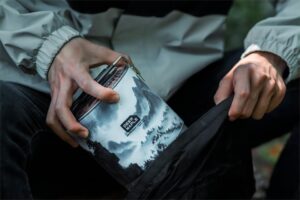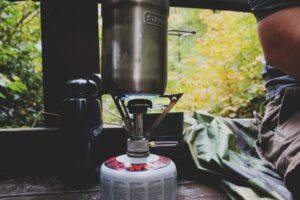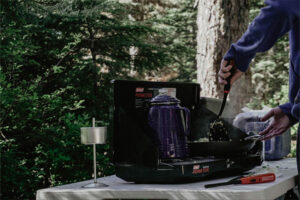
Do not plan overnight but months ago so that nothing is missed. Think about how far you want to hike, how remote the location is, and what the weather forecast says when packing for a backpacking trip. Generally speaking, the longer and/or more remote the hike and the more severe conditions you are going to want, the more clothing, gear, food, and water you are going to need. If you are new to backpacking, make sure to read this article and its tips before you head out.
A backpacking trip can be a lifelong experience, but don’t turn it into a nightmare by not selecting the right essentials. In this article, we will highlight what backpacking gear is and what gear is suitable for rain and backpacking around the world. Furthermore, take the additional tips and tricks with you to prevent any mishaps.
“Pack light, as there won’t be a donkey to lighten your load!”
What is Backpacking Gear?
Backpacking gear refers to the equipment you carry on your back when going on a multi-day hiking or camping trip where you sleep outdoors. It includes everything from the big essentials like your backpack and shelter to the smallest items like your toothbrush and headlamp. The specific gear you’ll need will vary depending on several factors, including:
- Trip duration:A weekend trip will require less gear than a multi-month adventure.
- Destination:Climate, terrain, and available resources will influence your choices.
- Season:Winter backpacking demands different gear than summer adventures.
- Personal preferences:Some may prioritize ultralight minimalism, while others prefer comfort and amenities.
Backpacking Gear for Rain
Rain can really put a damper on a backpacking trip, but with the right gear, you can stay dry and comfortable even in the worst downpours. Here are some essentials to pack:
Rain Jacket
A good rain jacket is your first line of defense against the elements. Look for a jacket made from a waterproof and breathable material, such as Gore-Tex or eVent. It should also have a hood and pit zips for ventilation.
Rain Pants
Rain pants will keep your legs dry from the rain and mud. Look for pants made from the same waterproof and breathable material as your rain jacket.
Gaiters
Gaiters cover your lower legs and ankles, preventing water and debris from entering your boots. They’re especially important in wet or muddy conditions.
Waterproof Backpack Cover
A waterproof backpack cover will keep your gear dry if you get caught in a sudden downpour.
Dry Bag
A dry bag is a waterproof bag that you can use to store your clothes, electronics, and other valuables.
Quick-Drying Clothes
Quick-drying clothes will help you stay comfortable if you do get wet. Merino wool is a great option for travel because it dries quickly and resists odor.
Hat with a Brim
A hat with a brim will help keep the rain out of your face and eyes.
Waterproof Boots
Waterproof boots will keep your feet dry in wet weather. Look for boots with good traction to prevent you from slipping on wet surfaces.
Trekking Poles
Trekking poles can help you keep your balance on wet and slippery trails.
Tips for Staying Dry While Backpacking in the Rain
· Plan your trip
Check the weather forecast before you go and avoid camping in areas that are prone to flooding.
· Stay aware of your surroundings
Be aware of the risk of landslides and flash floods in areas that have received heavy rain.
· Take breaks
If you get caught in a heavy downpour, it’s best to take shelter until the rain stops.
· Stay warm
If you get wet, change into dry clothes as soon as possible to avoid getting hypothermia.
The little rain can not ruin your backpacking trip if you pack the right gear and take precautions.
What to Take Backpacking Around the World?
Packing for a backpacking trip around the world can be daunting, but with some careful planning, you can pack lightly and efficiently. Here are some important things to consider:
Essentials
· Backpack
Choose a comfortable and durable backpack that fits your torso length and can carry all of your gear. A 40-50 liter pack is a good starting point, but you may need a larger pack if you’re planning on camping or hiking in remote areas.
· Travel documents
Make sure your passport is valid for at least six months beyond your travel dates and obtain any necessary visas. Keep copies of your passport and other important documents in a separate location in case of loss.
Electronics
Bring a smartphone with a local SIM card, a portable charger, and a camera. Consider bringing a laptop if you need to work on the road, but remember that it will add weight and bulk to your pack.
· First-aid kit
Pack a basic first-aid kit with essential medications, bandages, and antiseptic wipes.
Clothing
· Merino wool clothes
Merino wool is a great travel fabric because it’s breathable, wrinkle-resistant, and odor-resistant. Pack a few merino wool t-shirts, a long-sleeved shirt, and a pair of pants.
· Quick-drying clothes
Quick-drying clothes are essential for staying comfortable in hot and humid climates. Pack a few pairs of quick-drying shorts and a swimsuit.
· Rain gear
A packable rain jacket and pants are essential for any trip, regardless of the destination.
· Footwear
Pack a pair of comfortable hiking boots and a pair of sandals or sneakers for everyday wear.
Toiletries
· Sunscreen
Pack sunscreen with an SPF of 30 or higher to protect your skin from the sun.
· Insect repellent
Pack insect repellent with DEET to protect yourself from mosquitoes and other biting insects.
· Travel-sized toiletries
Pack travel-sized versions of your shampoo, conditioner, soap, and other toiletries.
Others
· Travel towel
A quick-drying travel towel is a great way to save space and weight.
· Headlamp
A headlamp is essential for camping and exploring in the dark.
· Water bottle
To stay hydrated while on the go, pack a reusable water bottle.
· Laundry bag
A mesh laundry bag is a great way to keep your dirty clothes separate from your clean clothes.
Packing tips
- Roll your clothes instead of folding them to save space.
- Pack heavier items in the bottom of your backpack and lighter items on top.
- Use packing cubes to organize your gear.
- Leave some extra space in your backpack for souvenirs.
Remember, the most important thing is to pack light and bring only what you need. You can always buy or rent additional items if you need them on the road.





